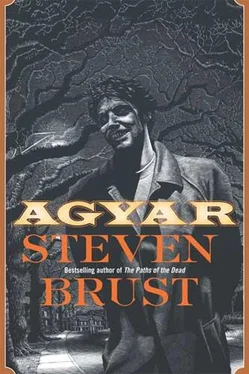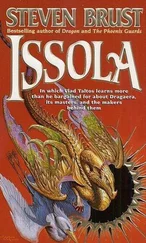Steven Brust - Agyar
Здесь есть возможность читать онлайн «Steven Brust - Agyar» весь текст электронной книги совершенно бесплатно (целиком полную версию без сокращений). В некоторых случаях можно слушать аудио, скачать через торрент в формате fb2 и присутствует краткое содержание. Жанр: sf_fantasy_city, на английском языке. Описание произведения, (предисловие) а так же отзывы посетителей доступны на портале библиотеки ЛибКат.
- Название:Agyar
- Автор:
- Жанр:
- Год:неизвестен
- ISBN:нет данных
- Рейтинг книги:3 / 5. Голосов: 1
-
Избранное:Добавить в избранное
- Отзывы:
-
Ваша оценка:
- 60
- 1
- 2
- 3
- 4
- 5
Agyar: краткое содержание, описание и аннотация
Предлагаем к чтению аннотацию, описание, краткое содержание или предисловие (зависит от того, что написал сам автор книги «Agyar»). Если вы не нашли необходимую информацию о книге — напишите в комментариях, мы постараемся отыскать её.
Agyar — читать онлайн бесплатно полную книгу (весь текст) целиком
Ниже представлен текст книги, разбитый по страницам. Система сохранения места последней прочитанной страницы, позволяет с удобством читать онлайн бесплатно книгу «Agyar», без необходимости каждый раз заново искать на чём Вы остановились. Поставьте закладку, и сможете в любой момент перейти на страницу, на которой закончили чтение.
Интервал:
Закладка:
On the Continent, however, I at once fell in love with the European railways, and in this way we traveled together for some months or years. I took her to my boyhood home, to which I had not returned in quite some time, and she showed me Paris. I remember very little of that city, except that I can recall thinking that it would be wonderful if there weren’t so many Frenchmen there. But mostly I was still involved with her, and I doted on her every word and action.
I remember her saying, “Things aren’t like they once were, and for that you ought to be grateful. For years, for decades, I would spend my time in the shadows of the great cities, only occasionally daring to venture out into the light of society, and then never for long. Now we can walk the streets, shop, visit the theater, and it is as if we exist within a shelter. The old terrors that hardened me and trained me are gone, and I wonder if you will ever appreciate the life you enjoy.”
I can remember looking at her as she spoke; she wore a dark tailored green dress, very tight at the waist, belted, with a long fur around her neck like a scarf. The hemline came above her ankles, but she wore very trim black boots with pointed toes and square heels. I wore a long coat with eight-inch fur cuffs, a large fur collar, a white silk cravat, and a top hat, I believe. She had picked the clothes out for me with care that felt loving to my befogged brain, and perhaps it was.
I remember these things, and what she said, and that it was late autumn, and that we were in Paris, yet I cannot remember what the streets looked like, or if we were sitting, standing, or walking. No, now that I think of it, I believe we were walking through a park and there was no one around, and no sounds except our speech, the faint clop and squeak of someone’s private coach a few hundred feet away, the songs of night birds, and, very faint, the titter of the rats of Paris, whose conversation never altered. The moon shone very bright on Laura’s face, giving it an odd yellowish tint and highlighting her arching eyebrows and deep-set, narrow eyes that were always so cold and blue.
I considered her words, and tried to imagine what it would have been like living in the times she spoke of, and at last I asked, “What changed?”
“Time,” she said. “The advent of this modern, scientific age.” There was more than just a hint of derision in her voice as she spoke.
“Will it last?”
“I believe it is very nearly ending already, more’s the pity.”
“What makes you think so?”
“You haven’t been keeping up with contemporary literature.”
“I never do, Laura,” I said. “I like older work.”
“Then you’re a fool,” she snapped. “There is no better way to keep track of the thinking of men, and if you don’t know what men are thinking, you don’t know what precautions to take.”
“Is that why we left England?”
“It was time to leave the English-speaking world for a while. I don’t know for how long.”
“Fortunately, you like French novels, too.”
“Yes, but French drama is impossible.”
“Still-”
“Yes. I’ll have a pretty good guess when it’s time to leave. But will you?”
“I? Won’t you be-”
“Not forever, Agyar Janos. How well can you read French?”
“Well enough.”
“Good. That may save you.”
“I’m glad you care what happens to me.”
She laughed, which for some reason I took as reassurance, although I cannot now imagine why I did.
We create our own omens, I think, and then mystify ourselves trying to understand their significance. That is, it feels very like an omen that this conversation has just now returned to me, in Technicolor and Dolby stereo, but I cannot imagine what it portends.
Jim keeps trying to understand what Kellem is up to. For that matter, so do I. He said, “I can’t figure out what she was hoping to get from having all of those policemen look at the house, or the reason for her visit.”
“I can’t either,” I said. “If I knew what she was trying to do, I could…”
“You could what?” he said.
“I don’t know. I’d feel better.”
“Well, it doesn’t make sense; no sir, it just doesn’t. If she wanted them to find you, she could have made you be more obvious, right?”
“Right.”
“And if she didn’t, what was the point?”
“To scare me, maybe; to get me to make a mistake.”
“Why go through all that to get you to make a mistake, when she could just tell you what mistake to make, and you’d have to do it?”
“There’s that,” I said.
“Maybe she isn’t after what you think she’s after.”
“Maybe.”
His eyes focused on me for a moment before shifting away again. “You look, I don’t know, younger than you did.”
“It’s what comes of a healthy life-style. You could take a lesson from it.”
“I surely could, yessir.”
We sat for a moment in a stillness that suddenly made me uncomfortable. I said, “I wish I could start a fire.”
“There’s no more wood in here; you’d have to bring it in from the carriage house.”
“Maybe I will. Want to toast marshmallows?”
That pulled a laugh from him, albeit a small one. “Sure. Then what would we do with them?”
“Nothing,” I said. “I just enjoy watching them burn.”
The storm has ended, and I am shivering with cold; my fingers are tingling as they return to life. Perhaps it is a torture I inflict on myself to type while my hands are in this condition. If so, it is stupid. I will wait for a few minutes, then resume.
There. That is better. I don’t know if I’ve mentioned before that the windows in the typing room (there are two, one facing west and the other facing south) are boarded up. They are covered by thin plywood strips, and not perfectly, so just at the moment, with all the clouds having dissipated as suddenly as they appeared, I am receiving some light from the half-moon, which is cutting through the slats and making a sharp white image across the keys as she sinks. The weather has warmed slightly, but it is still cold, or my fingers should have warmed up sooner; but I am not inclined to start yet another fire and warm myself up thoroughly. I wonder if it would be possible to get the furnace going; it is a hot-water radiator furnace and newer than one would suppose. Does this kind of furnace produce visible smoke? Probably.
I felt that Jill had recovered enough that I could go and see her again, although I made yet another firm resolve to stay away from Susan. She has a very active life, and I didn’t want her to come down with some strange illness that matched Jill’s, and would cause doctors to start paying attention. In a general sense, doctors are the least of my worries, but why should I take unnecessary chances? And I don’t really want to make Susan start missing classes.
So I said to myself.
Heh.
I took myself to the big white house with blue lights in the attic, I entered, and found the living room empty and the inside lights off. I climbed the stairs, nodded to the saint pictured in the stained glass, and came to Jill’s door, which I opened. She was awake, sitting up in bed, I think just staring off into space. She showed no surprise when I came in; just dropped her eyes, then unbuttoned the top of her nightgown, then looked at the wall in front of her and waited.
I looked at her carefully. She was still pale, as from illness, and had unhealthy-looking circles under her eyes. Her hand, outside of her blanket, seemed to tremble slightly. I shook my head, which attracted her attention enough that her eyes returned to me; she looked puzzled.
“Not tonight,” I said. “I have a headache.”
She frowned and shook her head slightly, not understanding. I sighed. “Just rest,” I said. “Eat a lot. You need to recover.”
Читать дальшеИнтервал:
Закладка:
Похожие книги на «Agyar»
Представляем Вашему вниманию похожие книги на «Agyar» списком для выбора. Мы отобрали схожую по названию и смыслу литературу в надежде предоставить читателям больше вариантов отыскать новые, интересные, ещё непрочитанные произведения.
Обсуждение, отзывы о книге «Agyar» и просто собственные мнения читателей. Оставьте ваши комментарии, напишите, что Вы думаете о произведении, его смысле или главных героях. Укажите что конкретно понравилось, а что нет, и почему Вы так считаете.












